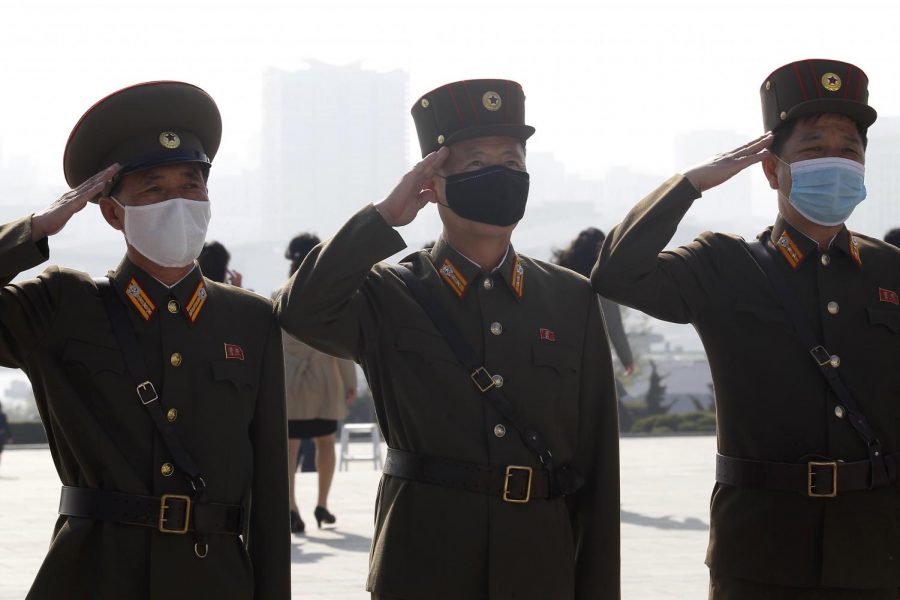A look inside North Korea’s personality cult
North Korean army officers visit the Mansu Hill on the occasion of the Day of the Sun, the birth anniversary of late leader Kim Il Sung, in Pyongyang, North Korea Thursday, April 15, 2021.
Apr 23, 2021
As an American, it is often easy to forget that the norms we have aren’t the norms of the world. Many countries still suffer from dictatorial rule, a lack of personal freedoms, a ruthless class system and support for female oppression. One such country is North Korea.
“Inside North Korea” by National Geographic takes viewers to a place heavily guarded from the public eye. Everywhere the reporters went, they were trailed by multiple guards. At one point, the videographer got on the ground to fit a large statue of Kim Jong Il into his camera frame, and he was told the team would be kicked out of the country for disrespecting such a sacred place.
In communications, North Korea is a case study. Somehow, the country has resisted technological and medical advances, relying on limited internet access granted only to those with special permission. The history books were written by Kim Jong Il, creating a doctored past that blinds citizens to reality. Thus, it’s no surprise that North Koreans praised him when he offered them any sort of basic care. They don’t know that across the world, things like heart transplants and brain surgeries were happening.
Even when there was a seemingly unflagging famine, known as the March of Suffering, the Kims would not admit weakness and ask other countries for aid.
North Korea is a place where time has slowed. For example, Dr. Sanduk Ruit entered the country to remove cataracts, a surgery that is relatively common by Western standards; however, North Koreans never had access to this sight-restoring procedure. Because of North Korea’s outdated healthcare, Ruit was scheduled to perform 1,000 surgeries in 10 days. That was the only time he was allowed to stay in the country, despite providing life-changing surgery. What’s more, the North Korean government only allowed Ruit to operate on patients they had pre-approved, AKA those who were loyal to the government.
So, people in North Korea are isolated, lied to, forced to abide by strict laws and expected to consistently express their undying love for their oppressor.
Yet, some behave as if they truly love the Kims. When Kim Jong Il died in 2011, people were weeping in the streets, visibly distraught by the passing of a ruler most never had a conversation with. This could be the result of brainwashing or fear. But what’s most perplexing is that often North Koreans’ emotions go beyond gratitude, and they demonstrate a genuine love for their rulers. They see the Kims as family, if not as wise father figures.
This is called familism, or a cult of personality. Basically, the love North Koreans have for their rulers is so intense that it mirrors a familial bond and discredits viewpoints other than those of the ruling family.
Of course, this is not the case for everyone in North Korea. Plenty have defected to either China or South Korea, even knowing that the journey is treacherous due to electrified fences and armed guards stationed at the borders.
Despite being trapped in a country without access to proper medical care and resources, where escapees risk death and punishment to their families, this cult of personality persists. Again, it’s a case study. It shows the power of nationalism and identity in leading, ruling and even rebelling.
Another example: the Kurdish people, often referred to as the Kurds, share an ethnic heritage, though there is no recognized Kurdish country. Because of their shared identity, the Kurds thought they should have a country, and they fought to win their homeland from Iraq, Iran, Syria and Turkey. This has been going on for the last 100 years.
Identity is oddly powerful. It can move millions to submission or action. It can start and end wars.
It’s easy to look at North Korea and think that the citizens must be brainwashed or afraid, and many may be, but there is also the undeniable presence of something more powerful — a shared family bond that showcases the unthinkable power of identity.













